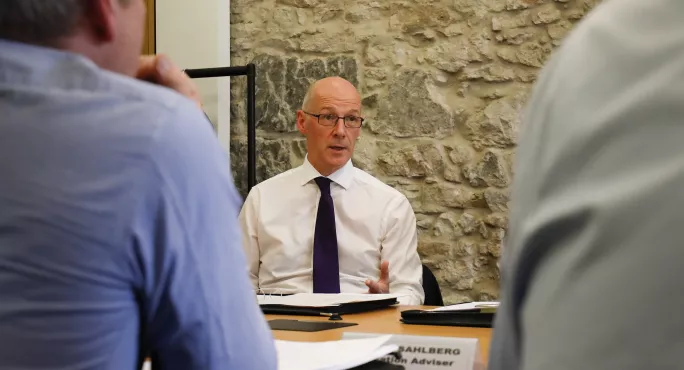- Home
- John Swinney: ‘Everywhere I go I see fantastic work’
John Swinney: ‘Everywhere I go I see fantastic work’

I regularly visit schools across Scotland and everywhere I go I see examples of fantastic work being carried out. I also hear feedback from teachers about the specific challenges they face day-to-day.
I want teachers to be empowered - not only to respond to the needs of the classroom but also to provide feedback that can enhance the whole system so pupils all over the country get the best possible experience.
That is why we are committed to empowering teachers. Pupil equity funding, for example, which is given directly to schools so teachers can spend it on interventions that work for them, is already having positive impacts in the classroom.
What’s happening in Scottish education? Visit the Tes Scotland news hub
Curricular reform: Is it time for Curriculum for Excellence 2.0?
Quick read: Testing of five-year-olds should continue, review says
I have seen projects that ensure pupils end their day with a bedtime story, increasing parental engagement and improving literacy, and breakfast clubs that provide a healthy and nutritious start to the day and give young people who have English as an additional language extra time with staff to work on their literacy skills.
There are too many exciting, engaging and effective interventions that I have had the privilege to see first-hand to even count.
That is why I know we are right to trust the instincts of our teachers and headteachers - after all, they know the everyday issues in their schools. They are also best placed to decide how to tackle these. This approach is having an impact: a recent Scotland-wide survey of more than 500 headteachers shows that almost nine out of 10 had seen improvement in closing the poverty-related attainment gap, with a further 95 per cent expecting additional improvement over the next five years.
The poverty-related attainment gap
We use a range of indicators to measure the attainment gap, including official statistics, which show an increase at all levels of attainment since 2009-10 - but it is extremely encouraging that the majority of headteachers are noticing improvements in their own school communities, too.
Work continues on closing the poverty-related attainment gap, though. The £50 million in additional funding I recently announced for Scottish Attainment Challenge authorities and schools will allow teachers to continue to focus their vital work in the areas where it is needed most.
If we want teachers to truly take ownership of the education system, we have to take steps to continue to support and nurture the talent and expertise we have within the profession and provide appropriate development opportunities.
As part of this, Education Scotland has launched an expanded package of headship development opportunities, based on feedback on the current provision from headteachers, to further enhance skills while providing strong leadership to their schools.
Evidence has shown that empowered leaders deliver the highest quality of learning and teaching and, encouragingly, 481 headteachers from across Scotland have already engaged with the Excellence in Headship programme. Even more encouraging is the fact that almost all participants agreed or strongly agreed that what they learned from the programme would influence or change their practice.
Finding time for personal development in an already hectic schedule can feel impossible. This enhanced programme of support, scaled up over the past few months and being developed further over the next year, provides yet more opportunities for headteachers to take time to focus on themselves.
A planned residential programme will allow time away from the classroom to reflect while discussing good practice with peers, and over 50 masterclasses will be offered throughout Scotland to create support networks for further inter-school communication.
I know from conversations with teachers that headship is not the right path for everyone, but that doesn’t mean that development should be in any way constrained.
New teaching career pathways
Thanks to the work of the Independent Panel on Career Pathways for Teachers, we have received recommendations to create new pathways that will represent a huge increase in the breadth of opportunities that a teaching career offers.
Amongst the recommendations provided by the panel is the creation of “lead teacher” roles. These roles will make use of the expertise held by teachers based on their time in the classroom to provide policy leadership on specialist areas such as curriculum, pedagogy and best practice in teaching and provision for pupils with additional support needs (ASN), amongst others.
These new development routes will allow teachers to have greater control over their career pathway, allowing them to flourish - with better access to coaching, mentoring and sabbaticals, as well as a fresh focus on masters learning - and derive greater job satisfaction while contributing to the furthering of the profession. I would encourage every teacher to give consideration to these opportunities.
We are developing a Scottish education system that delivers more, not just for pupils but for parents and teachers, too. By fostering and maintaining communication at all levels, we can ensure a cohesive dialogue between teachers, professional bodies and government that results in the right change, at the right time, in the right place.
John Swinney is Scotland’s education secretary and deputy first minister
Keep reading for just £1 per month
You've reached your limit of free articles this month. Subscribe for £1 per month for three months and get:
- Unlimited access to all Tes magazine content
- Exclusive subscriber-only stories
- Award-winning email newsletters



